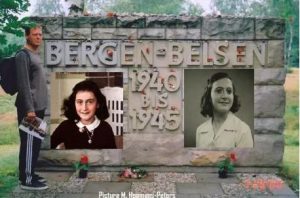Süskind, Walter, born 29-10-1906 in Lüdenscheid, Westphalia,  Germany, as the first child of Hermann Süskind and Frieda, born Kessler. Walter had two younger brothers, Karl Süskind (1908) and Alfred Süskind (1911).
Germany, as the first child of Hermann Süskind and Frieda, born Kessler. Walter had two younger brothers, Karl Süskind (1908) and Alfred Süskind (1911).
Süskind initially worked as a manager of a margarine factory in Germany. In March 1938, he fled to the Netherlands with the intention of emigrating to the United States, because of the persecution of Jews by the Nazis, like Anne Frank‘s familie did, 
 they also moved to Amsterdam. From 1942 until his deportation to Camp Westerbork,
they also moved to Amsterdam. From 1942 until his deportation to Camp Westerbork,  he lived at Nieuwe Prinsengracht 51 in the center of Amsterdam
he lived at Nieuwe Prinsengracht 51 in the center of Amsterdam  with his wife Johanna Natt (01-11-1906 – 1944) and their daughter Yvonne Süskind.
with his wife Johanna Natt (01-11-1906 – 1944) and their daughter Yvonne Süskind. 
 During the Second World War Walter became involved in helping children escape the Holocaust via the nursery on the Plantage Middenlaan in Amsterdam.
During the Second World War Walter became involved in helping children escape the Holocaust via the nursery on the Plantage Middenlaan in Amsterdam.


Süskind worked for the Dutch Jewish council. He was the manager of the Hollandsche Schouwburg (Dutch Theater), where the Jews of Amsterdam had to report prior to their deportation to the Westerbork transit camp. In that position he could manipulate the personal data of children in particular. His close relationship with the German authorities helped him in his activities to help children escape. He especially tried to get close to the SS officer Ferdinand Hugo “Ferdy” aus der Fünten,  who was then the second man of the Central Office for Jewish Emigration in Amsterdam. Ferdinand Hugo (Ferdy) aus der Fünten (Mülheim an der Ruhr, 17-12-1909 – Duisburg, 19-04-1989) was a German war criminal sentenced to death who, during World War II, was the de facto leader of the deportation of tens of thousands of Jews, particularly from Amsterdam. He was also involved in numerous raids. He belonged to the Four of Breda, later the Three and the Two of Breda. He served a life sentence for war crimes after a pardon and was released in January 1989. Eighty-two days after his release, Aus der Fünten died of a cerebral hemorrhage in West Germany at the age of 79.
who was then the second man of the Central Office for Jewish Emigration in Amsterdam. Ferdinand Hugo (Ferdy) aus der Fünten (Mülheim an der Ruhr, 17-12-1909 – Duisburg, 19-04-1989) was a German war criminal sentenced to death who, during World War II, was the de facto leader of the deportation of tens of thousands of Jews, particularly from Amsterdam. He was also involved in numerous raids. He belonged to the Four of Breda, later the Three and the Two of Breda. He served a life sentence for war crimes after a pardon and was released in January 1989. Eighty-two days after his release, Aus der Fünten died of a cerebral hemorrhage in West Germany at the age of 79.
Opposite the Hollandsche Schouwburg on the Plantage Middenlaan, there was a nursery. The Nazis put the young children there instead of in the theater. The Jewish director of the nursery, Henriette Henriques Pimentel, 
 together with Süskind and economist Raphäel “Felix” Halverstad
together with Süskind and economist Raphäel “Felix” Halverstad  (who also worked at the Hollandsche Schouwburg), set up a system to rescue children via the nursery. Children were secretly brought to the Hervormde Kweekschool (Reformed Teacher Training College), two houses from the theater. They got there through the garden. They received help from the head of the school, Johan van Hulst.
(who also worked at the Hollandsche Schouwburg), set up a system to rescue children via the nursery. Children were secretly brought to the Hervormde Kweekschool (Reformed Teacher Training College), two houses from the theater. They got there through the garden. They received help from the head of the school, Johan van Hulst.  From there, the children went into a backpack, shopping bag or laundry basket to be transported to Limburg and Friesland by train and tram, often with help from the Utrechts Kindercomité (Utrecht Children’s Committee)
From there, the children went into a backpack, shopping bag or laundry basket to be transported to Limburg and Friesland by train and tram, often with help from the Utrechts Kindercomité (Utrecht Children’s Committee)  of Piet Meerburg [nl]
of Piet Meerburg [nl]  and the NV, a secret organization that managed to organize many addresses in Limburg. Süskind and Felix Halverstad ensured that these children were not registered and removed their names from the records of the theater. Thanks to this plan, about 600 children were saved.
and the NV, a secret organization that managed to organize many addresses in Limburg. Süskind and Felix Halverstad ensured that these children were not registered and removed their names from the records of the theater. Thanks to this plan, about 600 children were saved.
Henriette Pimentel was transported to Westerbork with 70 children and 36 child care workers on 23-07-1943. On 14-09-1943 she was deported to Auschwitz where she was murdered immediately upon arrival on 17-09-1943, age 67. The nursery was closed on 29-09-1943, the building was demolished in 1976.
Death and burial ground of Süskind, Walter.


 Walter with his family in May 1942. Walter at the back right, his wife and daughter Yvonne at the front left – also his brothers with their families, his mother and his mother-in-law.
Walter with his family in May 1942. Walter at the back right, his wife and daughter Yvonne at the front left – also his brothers with their families, his mother and his mother-in-law.
In 1944, Süskind, his wife and his daughter were sent to the Westerbork transit camp. Due to his good relations with the SS leadership of the Dutch Theater, he was allowed to return to Amsterdam, but he eventually went back to his family in Westerbork. He also wanted to help people escape from the transit camp, but failed. His wife and daughter later died at the camp, and he himself died on 28-02-1945, age 38, at an unknown location in central Europe during the death marches. So his body was never really found but their is no gravestone for him. 
 German civilians, under direction of U.S. medical officers, walk past a group of 30 Jewish women starved to death.
German civilians, under direction of U.S. medical officers, walk past a group of 30 Jewish women starved to death.
On 19-01-2012, the Dutch movie Süskind  was released. This movie is based on the life of Walter Süskind.
was released. This movie is based on the life of Walter Süskind.

















Leave a Reply